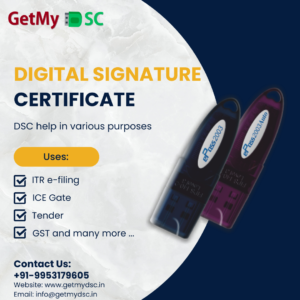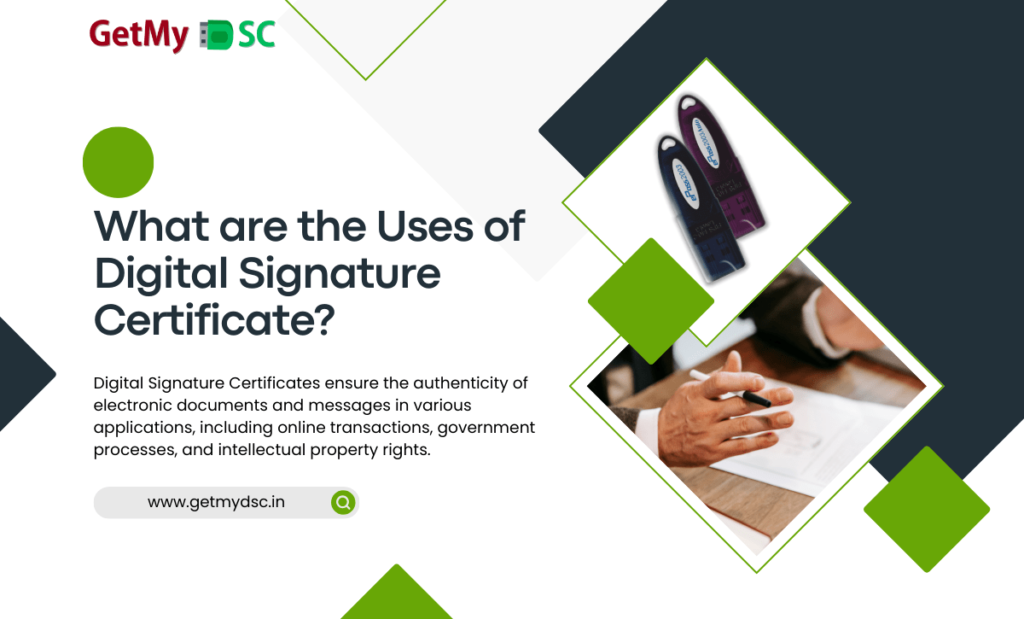In the digital age, the significance of digital signature certificates (DSCs) cannot be overstated. They serve as the digital equivalent of a handwritten signature or stamped seal, but with far more inherent security. A DSC contains information about the user’s identity and helps to validate the integrity of the signed document. Let’s delve into the various uses of digital signature certificates that make them indispensable in today’s digital world.
What is Digital Signature Certificate?
Table of Contents
 Digital Signature Certificate (DSC) is used to verify the legitimacy of an electronic message or document. It is issued by a Certification Authority (CA) and contains information about the user’s identity, such as name, email address, and public key. It allows individuals, organizations, and software applications to sign electronic documents and transactions with a secure and legally-binding digital signature. It uses public-key cryptography to ensure that the signature is unique to the signer and cannot be forged or altered. DSCs can be used for various purposes, such as e-filing of tax returns, online bidding, e-procurement, and e-tendering. They are commonly used in business, government, and legal transactions to provide authenticity, integrity, and non-repudiation to electronic documents and communications.
Digital Signature Certificate (DSC) is used to verify the legitimacy of an electronic message or document. It is issued by a Certification Authority (CA) and contains information about the user’s identity, such as name, email address, and public key. It allows individuals, organizations, and software applications to sign electronic documents and transactions with a secure and legally-binding digital signature. It uses public-key cryptography to ensure that the signature is unique to the signer and cannot be forged or altered. DSCs can be used for various purposes, such as e-filing of tax returns, online bidding, e-procurement, and e-tendering. They are commonly used in business, government, and legal transactions to provide authenticity, integrity, and non-repudiation to electronic documents and communications.
Benefits of Digital Signature Certificate
One of the primary benefits of a DSC is that it authenticate the identity of the signer. Signing a document with a DSC confirms that you are who you claim to be and that the signature is valid. This is crucial for transactions where identity verification is necessary, such as online banking, e-filing of taxes, and e-commerce transactions.
1. Ensuring Data Integrity
When a document is signed digitally, any alteration made to the document after the signing invalidates the signature. This ensures the data integrity of the document since any tampering can be easily detected.
2. Non-Repudiation
A DSC provides non-repudiation, which means the signer cannot deny the authenticity of their signature on a document. This is particularly important in legal proceedings and financial transactions, where proof of commitment is required.
3. Secure Email Communications
Digital signatures are used to secure email communications. By signing an email with a DSC, the sender can assure the recipient that the email has not been altered in transit, and the identity of the sender is verified.
4. Document Workflow Efficiency
DSCs streamline the document workflow by eliminating the need for physical presence to sign documents. Contracts, agreements, and other legal documents can be signed digitally, saving time and resources.
5. Government Transactions
Many government agencies require the use of DSCs for submitting applications, filings, and other forms online. This helps in reducing paperwork and expediting government services.
6. Software Distribution
For software developers, a DSC is used to sign software packages and updates. This assures users that the software is from a verified source and has not been tampered with.
7. Compliance and Standards
Organizations use DSCs to comply with industry standards and regulations. For instance, they are used to meet PCI standards, improve SEO rankings, and strengthen a brand’s identity.
The Multifaceted Uses of Digital Signature Certificate

Here are some of the common uses of Digital Signature Certificates:
1. Signing electronic documents
A DSC is used to digitally sign electronic documents, which ensures that the document has not been tampered with and that the signature belongs to the person or organization that signed it. This is commonly used in e-commerce, online banking, and government transactions.
2. Filing tax returns
In India, a Digital Signature Certificate is required to file income tax returns online. It ensures the authenticity of the taxpayer and the accuracy of the information provided in the tax return.
3. Company registrations
In many countries, a Digital Signature Certificate is required for registering a company. This is done to ensure the authenticity of the registration documents and to prevent fraud.
4. E-tendering
Many government agencies require a Digital Signature Certificate for participating in e-tendering processes. It ensures that the bidder is authentic and that their bid has not been tampered with.
5. Online bidding
A Digital Signature Certificate can be used in online bidding processes to ensure the authenticity of the bidder and their bid.
6. Banking transactions
Digital Signature Certificates are used in online banking transactions to ensure the authenticity of the user and the security of the transaction.
7. Intellectual property rights
A Digital Signature Certificate can be used to sign and file applications for patents, trademarks, and copyrights.
Conclusion
In summary, Digital Signature Certificates are used to ensure the authenticity and integrity of electronic documents and messages in various applications, including online transactions, government processes, and intellectual property rights.
They provide a secure and verifiable way to conduct transactions, communicate, and distribute software. As we move towards a more digital-centric society, the importance and uses of DSCs will only continue to grow. They are not just a tool for authentication but a means to ensure trust and integrity in the digital space.
Read More:
How to Choose the Right Type of Digital Signature Certificate?
